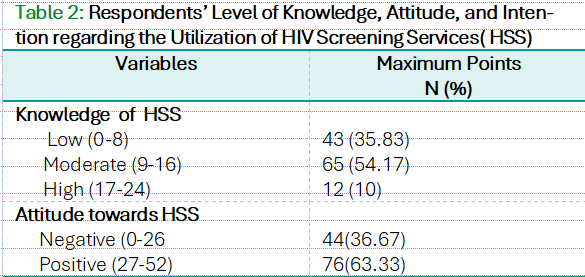Correlates of Intention to Utilize HIV Screening Services Among Adolescents In Selected Secondary Schools In Osogbo, Osun State Nigeria
Main Article Content
Abstract
Background
The spread of HIV/AIDS among the productive age group particularly young adults is a major public health concern in Nigeria. HIV screening services are affordable interventions that offer chances to raise knowledge about HIV and preventive measures. They are crucial parts of HIV prevention initiatives. This study investigated the level of knowledge, and attitude as correlates of intention to Utilize HIV Screening Services Among Adolescents in Selected Secondary Schools in Osogbo, Osun State, Nigeria.
Methods
Data were collected from 120 respondents who were conveniently selected from two senior secondary school at the two Local government areas in Osogbo, Osun state with semi-structured questionnaire (83% reliability). Data were analyzed using appropriate statistical tools.
Results
Most of the students were in the middle adolescence (14 – 16 years) age group. The Knowledge responses were grouped on a scale and the results showed that most of the adolescents had a moderate level of knowledge regarding HIV/AIDS and HIV Screening Services. Further results showed a fairly high and positive attitude for the participants (76.66%). There were significant correlations (at p < 0.05) between knowledge level (R = 0.348), attitude (R = 0.432), and Intention to Utilize HIV Screening Services. These factors are still quite modest, though. Additionally, knowledge level indicated that most participants were unaware of any importance of the utilization of HIV Screening services.
Conclusions
The report suggested launching vigorous campaigns of public health education and awareness that highlight the importance of utilizing HIV Screening services.
Downloads
Article Details

This work is licensed under a Creative Commons Attribution 4.0 International License.
This work is licensed under a Creative Commons Attribution 4.0 International (CC BY 4.0) license. To view a copy of this license, visit https://creativecommons.org/licenses/by/4.0/.
How to Cite
References
1. Dejene, M.(2013). Factors affecting accessibility and acceptability of Voluntary Counselling and Testing services for HIV/AIDS in Bahir Dar town, North West Ethiopia. Family Guidance association of Ethiopia ( FGAE) North West Branch, Retrieved from https://www.unicef.org/evaldatabase/files/ETH_2001_801.pdf
2. Desta, W. G., Sinishaw, M.A., & Bizuneh, K, D. (2017). Factors Affecting Utilization of Voluntary HIV Counseling and Testing Services among Teachers in Awi Zone, Northwest Ethiopia. AIDS Research and Treatment. https://doi.org/10.1155/2017/9034282 DOI: https://doi.org/10.1155/2017/9034282
3. Ijadunola, M. Y., Ojo, T. O., Ogunlesi, O., Adewumi, A., Kolade, R, O., & Thomas, B. (2015). Perceived hindrances and factors influencing acceptability of HIV/AIDS counseling and testing among commercial drivers in Ile-Ife. Nigerian Journal of Health Sciences, 15(1), 30- 35. https://doi.org/10.4103/1596-4078.171371 DOI: https://doi.org/10.4103/1596-4078.171371
4. Janz, N. K., & Becker, M. H. (1984). The health belief model: A decade later.Health Education & Behavior,(1), 1–47. https://doi.org/10.1177/109019818401100101. DOI: https://doi.org/10.1177/109019818401100101
5. Kharsany, A. B., & Karim, Q. A. (2016). HIV Infection and AIDS in Sub-Saharan Africa: Current Status, Challenges and Opportunities.Open AIDS Journal,(1), 34–48.://doi.org/10.2174/1874613601610010034 DOI: https://doi.org/10.2174/1874613601610010034
6. NACA. (2017).Strategic Framework on HIV and AIDS:2017-2021. Retrieved from https://naca.gov.ng/2013-national-hiv-validated-data-2-2/
7. National Agency for the Control of HIV and AIDS: GLOBAL AIDS RESPONSE Country Progress Report Nigeria GARPR. 2012. 17
8. Oguegbu, A., & Beatty, F. (2016). Relationship between HIV Counseling and Testing (HCT) Awareness and HCT Uptake among Young People in Nigeria: Implications for Social Change. World Journal of AIDS, 6, 123-136. https://doi.org/10.4236/wja.2016.64016 DOI: https://doi.org/10.4236/wja.2016.64016
9. Neumann-Böhme, S., Varghese, N. E., Sabat, I., Barros, P. P., Brouwer, W., van Exel, J., Schreyögg, J., & Stargardt, T. (2020). Once we have it, will we use it? A European survey on willingness to be vaccinated against COVID-19.The European Journal of Health Economics,(7), 977–982.://doi.org/10.1007/s10198-020-01208-6 DOI: https://doi.org/10.1007/s10198-020-01208-6
10. NIH. (2018). Basic HIV Prevention. https://hivinfo.nih.gov/understanding-hiv/fact-sheets/basics-hiv-prevention#:~:text=HIV%20can%20be%20transmitted%20only,Do%20not%20inject%20drugs.
11. Ofori, K. N. (2019). Application of the Health Belief Model to HIV Testing and Counselling Among Youth Living in Selected Rural Communities in Ghana,Journal of HIV/AIDS Prevention, Education and Behavioural Science. 5(1), 11-18. https://doi.org/10.11648/j.ijhpebs.20190501.12 DOI: https://doi.org/10.11648/j.ijhpebs.20190501.12
12. Ola, O. O., Oyerinde, O. O., Amosu, A. M., Degun, A. M., & Thomas, A. M. (2011). Methodological approaches to sexuality education in secondary schools in Ilisan Remo, Ogun State, Nigeria.of Applied Science Research,(2), 83–88.https://www.scholarsresearchlibrary.com/articles/methodological-approaches-to-sexuality-education-in-secondary-schools-in-ilisan-remo-ogun-state-nigeria.pdf
13. Oladeji, L. T. (2016). Perception, Attitude and Willingness of Civil Servants Towards HIV Counseling And Testing in the Ministry of Education Secretariat Ibadan, Oyo State. Retrieved from http://adhlui.com.ui.edu.ng/handle/123456789/356
14. Sharun, K., Rahman, C. K. F., Haritha, C. V., Jose, B., Tiwari, R., & Dhama, K. (2020). Covid-19 Vaccine Acceptance: Beliefs and Barriers Associated with Vaccination Among the General Population in India. Journal of Experimental Biology and Agricultural Sciences, (Spl-1-SARS-CoV-2), S210–S218. https://doi.org/10.18006/2020.8(spl-1-sars-cov-2).s210.s218 DOI: https://doi.org/10.18006/2020.8(Spl-1-SARS-CoV-2).S210.S218
15. Teklehaimanot,. D., Teklehaimanot, A.,Yohannes, M.,& Biratu, D. (2016). Factors influencing the uptake of voluntary HIV counseling and testing in rural Ethiopia: a cross sectional study. BMC Public Health, 16(239). https://doi.org/10.1186/s12889-016-2918-z DOI: https://doi.org/10.1186/s12889-016-2918-z
16. Troiano, G., & Nardi, A. (2021). Vaccine hesitancy in the era of COVID-19.Health,, 245–251. https://doi.org/10.1016/j.puhe.2021.02.025 DOI: https://doi.org/10.1016/j.puhe.2021.02.025
17. Choy, K.K., Rene, T.J., & Khan, S.A. (2013). Beliefs and Attitudes of Medical Students from Public and Private Universities in Malaysia towards Individuals with HIV/AIDS. The Scientific World Journal, 2013. DOI: https://doi.org/10.1155/2013/462826
18. Omeonu, P. E., Agbede, C., & Emea, M. K. (2014). Assessing the awareness, attitude and perception of adolescents for HIV/AIDS education in Nigeria: the case study of Sagamu Remo Ogun State.Journal of Nursing and Health Science,(5), 85–88.https://doi.org/10.9790/1959-03518588 DOI: https://doi.org/10.9790/1959-03518588
19. Onyeonoro, U.U., Emelumadu, O.F., Chuku, A., Kanu, O.O., Ebenebe, U.E., Onwukwe, N.,& Ndukwe, E. (2014). Knowledge and Utilization of HIV Counseling and Testing Services among Students of a Tertiary Institution in Abia State, South East Nigeria. Journal of HIV and Human Reproduction, 2, 8-14. https://doi.org/10.4103/2321-9157.135743 DOI: https://doi.org/10.4103/2321-9157.135743
20. Osun State Government (2016). Major Towns: Osogbo. The Official Website of the State of Osun. http://www.osun.gov.ng/. Accessed 16 April, 2016.
21. WHO. (2014). Adolescent HIV Testing, Counselling and Care. Retrieved from https://www.who.int/maternal_child_adolescent/documents/hiv-testing-counselling/en/





